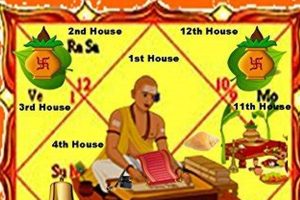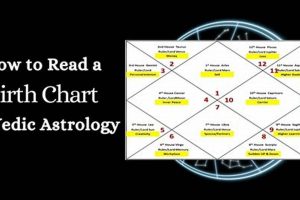Jyotish, often referred to as Indian or Hindu astrology, offers interpretations of celestial positions to provide insights into an individual’s personality, relationships, career, and life path. A consultation involves analyzing birth charts (horoscopes) calculated based on the precise time, date, and place of birth. These charts are then used to understand planetary influences and predict potential future trends.
This ancient practice is deeply rooted in Vedic traditions and philosophy. Proponents value its potential to provide self-awareness, guidance for decision-making, and a deeper understanding of karmic influences. By examining the interplay of planets and constellations, practitioners aim to offer clarity and perspective on various life aspects, empowering individuals to navigate challenges and capitalize on opportunities. The historical significance of Jyotish demonstrates its enduring relevance in shaping personal beliefs and practices.
This exploration delves further into the core components of Jyotish, including planetary influences, the significance of houses and signs, and the different types of charts employed. It will also address the role of an astrologer and the ethical considerations involved in this practice.
Tips for Approaching Astrological Consultations
Navigating the complexities of life can be challenging. These guidelines aim to offer a framework for engaging with astrological insights effectively.
Tip 1: Approach with an Open Mind: Cultivate a receptive mindset, recognizing that interpretations offer potential pathways, not fixed destinies. An open perspective allows for greater self-reflection and exploration.
Tip 2: Provide Accurate Birth Details: Precise birth informationdate, time, and locationis crucial for generating an accurate chart, forming the foundation of any meaningful analysis.
Tip 3: Formulate Specific Questions: Clearly defined questions facilitate focused discussions and allow practitioners to address particular areas of concern or interest.
Tip 4: Research Practitioners Thoroughly: Seek experienced and reputable practitioners who demonstrate ethical conduct and a commitment to providing insightful interpretations. Referrals and testimonials can be valuable resources.
Tip 5: Integrate Insights with Self-Reflection: Combine astrological guidance with introspection to gain a more comprehensive understanding of oneself and one’s circumstances.
Tip 6: Avoid Over-Reliance: While consultations can offer valuable perspectives, maintain personal agency and avoid excessive dependence on astrological predictions.
Tip 7: Be Patient and Realistic: Meaningful change and growth require time and effort. Allow for gradual development and avoid expecting instant solutions.
By adhering to these suggestions, individuals can maximize the potential benefits of astrological consultations and integrate these insights into a balanced approach to lifes journey. These tips pave the way for a more informed and empowered approach to navigating life’s complexities.
This concludes the exploration of practical tips, leading into a concluding summary of key principles and potential applications.
1. Birth Chart Analysis
Birth chart analysis serves as the cornerstone of Vedic astrology readings. A birth chart, also known as a horoscope or kundali, is a celestial snapshot depicting the positions of planets at the moment of an individual’s birth. This intricate map forms the basis upon which astrologers interpret planetary influences and their impact on an individual’s life. The accuracy of the birth chart, reliant on precise birth data (time, date, and location), directly affects the validity and depth of subsequent interpretations. A flawed birth time, for instance, can skew the entire chart, leading to potentially inaccurate readings.
The birth chart is divided into twelve houses, each representing a specific domain of life such as career, relationships, finances, and health. The planets, positioned within these houses and in various signs of the zodiac, interact dynamically, creating unique patterns that reflect individual predispositions and potential life experiences. For example, the placement of Jupiter in the second house might suggest financial prosperity, while Saturn in the same house could indicate financial challenges or delayed gratification. Understanding these planetary placements and their interactions within the houses is crucial for a comprehensive analysis.
In essence, the birth chart acts as a personalized roadmap. It provides a framework for understanding inherent strengths and weaknesses, karmic patterns, and potential life trajectories. A skilled astrologer utilizes this roadmap to offer guidance, insights into potential challenges, and strategies for navigating life’s complexities. The efficacy of a Vedic astrology reading hinges on the accuracy and depth of the birth chart analysis, underscoring its fundamental importance. This analysis provides the context for understanding the nuances of planetary influences and their impact on individual destinies.
2. Planetary Influences
Planetary influences form the core of Vedic astrology readings. Each planet embodies specific energies and archetypal qualities believed to affect human experience. These influences are not deterministic but rather represent predispositions and tendencies. The interplay of these planetary energies, as depicted in the birth chart, shapes individual personality traits, karmic patterns, and potential life events. For instance, a prominent Sun placement might indicate leadership qualities and a strong sense of self, while a prominent Moon placement might suggest emotional sensitivity and nurturing tendencies. The position of Mars can signify assertiveness and drive, while Venus reflects relational dynamics and aesthetic appreciation. Understanding these fundamental planetary archetypes is crucial for interpreting the complexities of a birth chart.
The positioning of planets within the twelve houses and the various zodiac signs further refines their influence. A planet in a particular house affects the area of life associated with that house. For example, Mercury in the tenth house might suggest a career in communication or intellectually stimulating fields. Simultaneously, the zodiac sign in which a planet resides colors its expression. A fiery Mars in Aries might manifest as impulsive energy, while a watery Mars in Pisces might express as subtle yet persistent determination. This nuanced interplay between planets, houses, and signs provides a rich tapestry of information regarding individual potentials and challenges.
The study of planetary influences within Vedic astrology offers profound insights into the forces shaping individual lives. This understanding provides a framework for navigating lifes complexities, recognizing karmic patterns, and making informed decisions. While acknowledging the influence of planetary energies, it is essential to remember that free will and conscious choices play a significant role in shaping ones destiny. Planetary influences offer guidance, not predetermined outcomes, empowering individuals to navigate their life paths with greater awareness and purpose.
3. Predictive Techniques
Predictive techniques within Vedic astrology offer a glimpse into potential future trends and life events. These techniques, grounded in astronomical calculations and planetary cycles, provide a framework for understanding the unfolding of karmic patterns and potential opportunities. While predictions are not absolute pronouncements of destiny, they offer valuable insights into potential challenges and opportune periods. A skilled astrologer uses these techniques to guide individuals toward informed decision-making and navigating life’s complexities with greater awareness.
- Planetary Transits (Gochara):
Planetary transits refer to the continuous movement of planets through the zodiac. These transits interact with the static positions of planets in an individual’s birth chart, creating dynamic influences that can manifest as specific life events or shifts in circumstances. For example, a Jupiter transit over the natal Moon might bring about a period of emotional well-being and prosperity, while a Saturn transit might present challenges and require greater discipline. Understanding these transiting influences provides a valuable tool for anticipating potential opportunities and navigating challenging periods.
- Planetary Periods (Dasha System):
The Dasha system is a unique feature of Vedic astrology that divides an individual’s life into specific planetary periods, each associated with a particular planet’s influence. These periods, ranging from a few months to several years, shape the overall direction and theme of life experiences during their duration. For example, a Jupiter Dasha might signify a time of growth, expansion, and good fortune, while a Rahu Dasha might bring about unexpected changes and karmic lessons. Understanding the influence of the current planetary period provides valuable context for interpreting life events and making informed decisions.
- Annual Chart (Varshaphal):
The Varshaphal, or annual chart, provides a yearly forecast based on the position of the Sun on an individual’s birthday. This chart reveals potential themes and areas of focus for the year ahead, highlighting opportunities and potential challenges. For example, a strong emphasis on the tenth house in the Varshaphal might suggest a year of career advancement, while an emphasis on the sixth house might indicate a focus on health and service. The annual chart provides a valuable tool for planning and navigating the year ahead with greater awareness.
- Lunar Progressions (Chandra Bala):
Lunar progressions track the movement of the Moon through the birth chart, providing insights into emotional and psychological developments over time. This technique can illuminate shifting emotional patterns, relationships dynamics, and inner growth processes. For instance, a progressed Moon moving through the seventh house might signify a focus on partnerships and relationships. Understanding lunar progressions can offer valuable self-awareness regarding emotional needs and patterns.
These predictive techniques, when combined with a thorough analysis of the birth chart, offer a comprehensive view of potential life trajectories and opportunities for growth. While these techniques provide valuable insights, it’s crucial to remember that they are tools for understanding potential, not fixed destinies. Free will and conscious choices play a significant role in shaping individual experiences. By integrating these predictive insights with self-awareness and mindful action, individuals can navigate their life paths with greater clarity and purpose.
4. Remedial Measures
Remedial measures in Vedic astrology, often termed “upayas,” address perceived planetary afflictions or imbalances identified within a birth chart. These measures aim to mitigate potential negative influences and enhance positive planetary energies, thereby promoting well-being and facilitating smoother life paths. The rationale behind these measures rests upon the principle of balancing planetary energies to harmonize an individual’s life with cosmic influences. Remedial measures are integral components of Vedic astrology, reflecting the proactive approach of this ancient system in addressing potential challenges. A birth chart might reveal a weakened Jupiter, potentially impacting prosperity and wisdom. Remedial measures in such a case could involve specific mantras, gemstone recommendations, acts of charity, or rituals aimed at strengthening Jupiter’s influence.
Upayas vary based on the specific planetary imbalances or afflictions identified in a reading. Gemstone recommendations consider the specific energies associated with each gem and their resonance with planetary influences. Mantras, sacred sounds or verses, are believed to invoke specific deities or energies, addressing particular planetary influences. Charitable acts aligned with specific planets can also serve as remedial measures. For instance, donating food can be associated with strengthening the Moon’s influence, while donating educational resources can be linked to Jupiter. Yagyas, Vedic fire rituals, are more elaborate ceremonies invoking divine blessings and seeking to harmonize planetary energies. These diverse remedial measures aim to restore balance and promote well-being, acting as practical tools for mitigating potential negative influences.
While remedial measures offer potential support in navigating life’s challenges, they do not guarantee specific outcomes or override free will and individual actions. These practices are often integrated with lifestyle adjustments, mindful decision-making, and self-reflection to promote holistic well-being. Ethical considerations regarding remedial measures underscore the importance of avoiding superstitious interpretations or excessive reliance on external remedies. The judicious and informed application of these measures, guided by experienced practitioners, can complement self-effort and empower individuals to navigate their life paths with greater awareness and resilience. Integrating these measures with a balanced approach to life fosters a deeper understanding of the interplay between individual actions and cosmic influences.
5. Karmic Insights
Vedic astrology offers a unique perspective on karma, viewing it not as fatalistic pre-destiny but as a complex interplay of past actions and their influence on present experiences. A Vedic astrology reading delves into these karmic patterns, providing insights into recurring themes, challenges, and opportunities for growth. By understanding these karmic influences, individuals gain a deeper understanding of their life’s trajectory and potential for transformation. This exploration illuminates how specific placements and planetary combinations within a birth chart can reveal karmic debts, lessons, and the potential for evolutionary growth.
- Planetary Placements and Karmic Indicators:
Specific planetary placements within the birth chart can serve as karmic indicators. Saturn, often associated with karma and lessons, plays a significant role in revealing areas requiring discipline and perseverance. The position of the Lunar Nodes (Rahu and Ketu) is considered crucial in understanding karmic debts and the direction of soul growth. For instance, Saturn in the tenth house might indicate karmic lessons related to career and public life, while Ketu in the fifth house might suggest past-life experiences related to creativity and self-expression. These placements provide valuable clues about the nature of karmic influences at play.
- The Role of Houses in Karmic Understanding:
The twelve houses in a birth chart represent different spheres of life. Planetary placements within these houses can reveal specific areas where karmic influences manifest. For example, planets in the sixth house might relate to karmic debts concerning health or service, while planets in the eighth house might signify karmic patterns related to transformation and shared resources. Understanding these house-specific influences provides a framework for addressing karmic imbalances in various life domains.
- Nakshatras (Lunar Mansions) and Karmic Patterns:
The 27 Nakshatras, or lunar mansions, provide further granularity in understanding karmic influences. Each Nakshatra possesses unique qualities and symbolic meanings that can shed light on specific karmic patterns. For instance, birth under certain Nakshatras might indicate a predisposition towards specific talents, challenges, or spiritual inclinations. Analyzing the Nakshatras occupied by key planets in the birth chart offers deeper insights into the nuances of karmic influences.
- Remedies and Karmic Evolution:
Vedic astrology offers remedial measures (upayas) aimed at mitigating negative karmic influences and enhancing positive ones. These measures, including mantras, gemstone recommendations, and charitable acts, are intended to support karmic evolution and facilitate spiritual growth. By engaging in these practices, individuals can actively address karmic imbalances and move towards greater harmony and fulfillment. Remedial measures are not meant to bypass karmic lessons but rather to navigate them with greater awareness and resilience.
Understanding karmic influences through Vedic astrology provides a profound framework for self-awareness and personal growth. By recognizing recurring patterns and addressing karmic imbalances, individuals gain the potential to transform challenges into opportunities for evolution. This perspective empowers individuals to take ownership of their life paths and move toward greater fulfillment and purpose. Vedic astrology emphasizes that while the past influences the present, conscious choices and actions shape the future, offering a path toward liberation from limiting karmic patterns.
6. Life Path Guidance
Life path guidance forms a central pillar within Vedic astrology readings. Consultations offer a roadmap for navigating life’s complexities, not by dictating a fixed destiny, but by illuminating potential pathways and inherent strengths. This guidance empowers individuals to make informed decisions aligned with their unique karmic blueprint. A reading analyzes planetary placements and their interplay, revealing potential obstacles and opportunities across various life domainscareer, relationships, finances, and health. This understanding allows individuals to anticipate potential challenges and capitalize on favorable periods for specific endeavors. For example, an individual with a strong emphasis on the tenth house might be guided toward career pursuits that utilize their inherent leadership skills, while someone with a prominent fifth house might be encouraged to explore creative endeavors. This personalized guidance facilitates a more purposeful and fulfilling life journey.
The practical significance of this guidance lies in its ability to foster self-awareness and informed decision-making. Individuals gain a deeper understanding of their strengths, weaknesses, and karmic predispositions, empowering them to make choices aligned with their authentic selves. Life path guidance does not negate free will; rather, it enhances it by providing a framework for understanding the karmic landscape and navigating life’s complexities with greater awareness. For instance, understanding a challenging Saturn transit can equip individuals with the foresight to approach situations with greater patience and resilience. This proactive approach empowers individuals to navigate potential difficulties with greater equanimity and transform challenges into opportunities for growth. This can manifest as making conscious career shifts, pursuing further education aligned with inherent talents, or seeking compatible partnerships based on astrological compatibility analysis.
Integrating life path guidance derived from Vedic astrology empowers individuals to approach life with greater clarity and purpose. While consultations provide valuable insights, personal responsibility and self-effort remain crucial for navigating life’s journey. Vedic astrology serves as a tool for self-discovery and informed decision-making, facilitating alignment with one’s karmic blueprint and fostering a more meaningful and fulfilling life experience. Challenges arise when interpretations are taken as deterministic pronouncements rather than as guiding insights. Maintaining a balanced perspective, integrating astrological guidance with personal agency, allows individuals to harness the wisdom of this ancient system for personal growth and empowerment. This integration leads to a more conscious and fulfilling life journey, where individuals navigate their paths with greater awareness and purpose.
7. Self-Discovery
Vedic astrology readings offer a unique lens for self-discovery, providing a framework for understanding inherent strengths, weaknesses, and karmic predispositions. This exploration facilitates a deeper understanding of one’s motivations, behavioral patterns, and potential life path. By illuminating the interplay of planetary influences at the time of birth, these readings can catalyze profound self-awareness and personal growth. This process empowers individuals to make more conscious choices aligned with their authentic selves, fostering a greater sense of purpose and fulfillment.
- Understanding Inherent Strengths and Weaknesses:
Analysis of planetary placements and their interactions within the birth chart illuminates inherent strengths and weaknesses. Recognizing these predispositions empowers individuals to leverage strengths effectively and address areas requiring development. For example, a prominent Mars placement might indicate natural assertiveness, which can be channeled into leadership roles or athletic pursuits. Conversely, a debilitated Saturn might suggest a tendency towards procrastination, highlighting the need for cultivating discipline and structure. This awareness facilitates conscious self-improvement and informed decision-making.
- Unveiling Karmic Patterns and Life Lessons:
Vedic astrology provides insights into karmic patterns, revealing recurring themes and life lessons. Understanding these patterns empowers individuals to break free from limiting cycles and make conscious choices aligned with their soul’s evolutionary journey. The placement of the lunar nodes (Rahu and Ketu) and Saturn offers valuable clues about karmic debts and areas requiring attention. For instance, Ketu in the fourth house might suggest a need to detach from familial patterns, fostering greater independence. Recognizing these karmic influences facilitates personal growth and transformation.
- Recognizing Dharma (Life Purpose):
Vedic astrology can illuminate an individual’s dharma, or life purpose, by analyzing planetary placements and their alignment with specific life paths. This understanding helps individuals discover their unique talents and passions, guiding them toward fulfilling careers and life choices. A strong emphasis on the tenth house, coupled with benefic planetary influences, might suggest a calling towards public service or leadership roles. Recognizing one’s dharma provides a sense of direction and purpose, empowering individuals to live authentically and contribute meaningfully to the world.
- Cultivating Self-Acceptance and Empowerment:
Through self-awareness fostered by astrological insights, individuals cultivate greater self-acceptance and empowerment. Understanding inherent strengths, weaknesses, and karmic patterns fosters compassion for oneself and reduces self-judgment. This acceptance empowers individuals to embrace their unique qualities and navigate life’s challenges with greater resilience and confidence. This integration of self-knowledge leads to a more harmonious and fulfilling life experience.
By integrating these facets of self-discovery, Vedic astrology readings provide a powerful tool for personal growth and transformation. This process empowers individuals to navigate life with greater awareness, purpose, and fulfillment, leading to a deeper understanding of their place within the cosmos and their potential for evolutionary growth. The insights gained from Vedic astrology empower individuals to take ownership of their lives and create a future aligned with their authentic selves and karmic blueprint.
Frequently Asked Questions about Vedic Astrology
This section addresses common inquiries regarding Vedic astrology, offering clarity and dispelling misconceptions surrounding this ancient practice.
Question 1: How does Vedic astrology differ from Western astrology?
Vedic astrology utilizes a sidereal zodiac based on the fixed constellations, while Western astrology employs a tropical zodiac based on the equinoxes. This fundamental difference results in varying zodiac signs for the same birth date. Vedic astrology also places greater emphasis on lunar mansions (Nakshatras) and planetary periods (Dashas) in its interpretations.
Question 2: Is Vedic astrology fatalistic?
Vedic astrology emphasizes free will and the potential for growth. While planetary positions indicate predispositions and karmic patterns, they do not dictate a fixed destiny. Individuals possess agency in shaping their lives through conscious choices and actions. Astrological insights serve as guidance, not predetermined outcomes.
Question 3: What is the significance of a birth chart?
A birth chart, or horoscope, provides a celestial snapshot of planetary positions at the moment of birth. This intricate map serves as the foundation for astrological interpretations, revealing individual strengths, weaknesses, karmic patterns, and potential life paths. The accuracy of birth data (time, date, and location) is crucial for generating a reliable birth chart.
Question 4: How can one find a qualified Vedic astrologer?
Seek practitioners with demonstrable experience, knowledge of Vedic scriptures, and ethical conduct. Referrals, testimonials, and professional affiliations can be valuable resources in identifying qualified and reputable astrologers.
Question 5: What are remedial measures in Vedic astrology?
Remedial measures, or “upayas,” aim to mitigate potential negative planetary influences and enhance positive ones. These measures can include gemstone recommendations, mantra recitation, charitable acts, and specific rituals. They are not quick fixes but rather supportive practices intended to promote balance and well-being.
Question 6: How often should one consult a Vedic astrologer?
Consultation frequency depends on individual needs and circumstances. Annual chart readings (Varshaphal) offer yearly guidance, while specific consultations can address particular questions or concerns as they arise. Over-reliance on frequent consultations should be avoided, as maintaining personal agency remains crucial.
Understanding these fundamental aspects of Vedic astrology provides a foundation for approaching consultations with clarity and discerning interpretations effectively. A balanced perspective, integrating astrological insights with personal agency, empowers individuals to navigate life’s complexities with greater awareness and purpose.
This concludes the FAQ section, paving the way for a deeper exploration of specific astrological concepts and techniques.
Conclusion
This exploration has delved into the multifaceted nature of Vedic astrology consultations, examining their core components, predictive techniques, remedial measures, and potential benefits. From birth chart analysis to understanding karmic influences and life path guidance, the intricate system of Jyotish offers a framework for self-discovery and informed decision-making. The emphasis on planetary influences, houses, signs, and the nuanced interplay of these elements provides a rich tapestry of information, empowering individuals to navigate life’s complexities with greater awareness.
Jyotish, as a tool for self-understanding, invites contemplation and reflection. Its potential lies not in deterministic predictions, but in providing a personalized roadmap for navigating life’s journey. By integrating these ancient insights with conscious choices and mindful action, individuals can cultivate greater self-awareness, unlock inherent potential, and move toward a more fulfilling and purposeful life. Further exploration and engagement with qualified practitioners can deepen understanding and facilitate the integration of these principles into a balanced and meaningful life.







